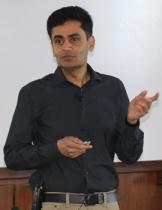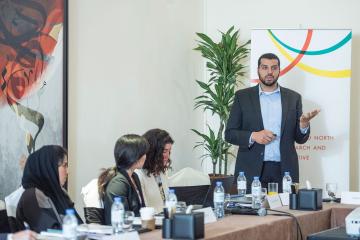
Celebrating a J-PAL milestone

J-PAL has just reached a milestone: we now have over 1,000 researchers in our network. Each and every one of these researchers are central to our mission of improving lives through evidence. They conduct cutting-edge research on important policy questions and those research results advance evidence-informed policymaking and the field itself. But that is not all—they also provide incredible public service in leading our regional offices, sector work, and the research initiatives that are at the heart of J-PAL.
All of this began in 2003 when Abhijit Banerjee, Esther Duflo, and Sendhil Mullainathan founded the Poverty Action Lab at MIT. Marianne Bertrand, Dean Karlan, Michael Kremer, Dan Levy, and Edward Miguel joined them and together, they became our eight founding affiliated professors. They were all united by a desire to alleviate poverty by applying randomized evaluations to social policy questions.
At the time, it was a nascent field and few economists were engaging in this type of research. There was uncertainty about what kinds of questions randomized evaluations could answer or even if other audiences would be interested in the results. So how did we get from eight researchers to over 1,000?
Across academia, among program implementers, and in the philanthropic world, there was a growing realization that this rigorous, scientific approach could have broader, field-changing implications. As our founding affiliates started doing field evaluations in partnership primarily with NGOs, more and more donors, eager to measure the impact of programs they funded, started supporting the field evaluations to help provide them with clear-cut answers.
Meanwhile, more graduate students were drawn to the field and to the methodology and started training with our founding affiliates on how to conduct randomized evaluations. This made it possible for more RCT research to take place, and we now have over 2,400 RCTs completed or ongoing by those in our research network.
Fast forward to 2025 and those eight affiliated professors are now 360 affiliated professors, alongside 733 invited researchers and 114 J-PAL Scholars. The 1,207 members of our research network are based at more than 400 universities across over fifty countries, representing a wide range of perspectives informing rigorous research.
Informing policy with research

Research from our affiliate network reaches nearly every corner of the world and has informed countless policy decisions and program scale ups. Some of the biggest early successes came from research on Teaching at the Right Level, deworming to increase school attendance, and the Graduation Approach, which reached millions of people and influenced significant policy and funding decisions.
That work has continued in every sector and every region of the world. For example, in the Indian states of Odisha and Punjab, Co-Chair of J-PAL’s Gender sector Seema Jayachandran and affiliated researcher Tarun Jain scaled up a gender equity curriculum that their research found to be significant in breaking down gender norms among adolescents. Alongside the NGO Breakthrough and their coauthor Diva Dhar, Seema and Tarun have worked with J-PAL South Asia and government partners to integrate the curriculum in classrooms across both states, which is expected to reach four million students by 2026.
Halfway around the world in Chile, J-PAL affiliated researchers Francisco Gallego and Claudia Martinez collaborated with the Chilean government to design a social protection program during the Covid-19 pandemic. Drawing on evidence from 24 randomized evaluations, they proposed a cash transfer program to assist informal workers and vulnerable households excluded from existing social protection databases.
This evidence-informed proposal shaped the creation of Chile’s Ingreso Familiar de Emergencia program, launched in May 2020. Within its first five months, the program provided US$830 million in cash transfers to over 3 million households, helping mitigate poverty and economic hardship during the crisis.
Alongside their research and teaching obligations, our researchers work closely with J-PAL policy staff to distill research results into easily-understandable lessons for policymakers, shape global conversations through speaking at major policy gatherings and writing widely-read op-eds, and meet directly with policymakers and practitioners to build long-term partnerships and steer efforts toward effective, evidence-informed policies.
Take a look at the other ways our affiliated researchers contribute to our mission.
Setting research agendas
Beyond their research and policy efforts, our affiliates also play an important role in guiding the direction of our work. By serving as academic co-chairs of our sector teams and research initiatives, and scientific directors of our regional offices, our Board members work with staff, partners, and funders to select the most pressing research topics to prioritize for meaningful policy change.
In particular, our affiliates’ work on our research initiatives has helped create a worldwide research infrastructure to support rigorous randomized evaluations of social programs and policies designed to improve people's lives. Many more affiliated researchers take the time to review research proposals and help ensure that the projects J-PAL funds are rigorous and policy-relevant. To date, our initiatives have supported over 1,400 projects that set out to pilot, evaluate, and scale interventions that answer crucial global questions.
Increasing demand for evidence-informed policy
At J-PAL’s many training events, such as our in-person, three- to five-day Evaluating Social Programs courses offered around the world, affiliated professors lead lectures on key topics and engage directly on skill-building with policymakers and practitioners, sharing insights on effective research methods, evidence-based policymaking, and building local capacity for research. Their dedication to fostering knowledge-sharing amplifies our impact and helps equip policymakers with the tools they need to create meaningful change.
Throughout this journey, we also saw a need to make an education on applying and using randomized evaluations more widely accessible. With MIT’s Department of Economics, we created an online MicroMasters Program in Data, Economics, and Design of Policy (DEDP) to equip learners with the practical skills and theoretical knowledge to tackle poverty alleviation using evidence-based approaches. The DEDP MicroMasters program has now trained over 300,000 learners coming from more than 200 countries.
Strengthening the J-PAL network
At J-PAL, we know that we are in a position to support the growth of the research network—and help ensure that the network reflects the regions and populations that we worked with, including those with backgrounds traditionally underrepresented in economics. To that end, we continue to grow our research network and create more research resources that are accessible to all.
We have also expanded our support for researchers from low- and middle-income countries through our J-PAL Scholars program. So far, the program has provided research funding and mentorship to 146 scholars and fellows from 18 countries across Africa, the Middle East, and South Asia. These researchers have been awarded over $2.1 million in dedicated grants and fellowships to advance studies in areas such as finance, agriculture, education, health, and humanitarian protection.
To support J-PAL Scholars as they navigate the field of economic development, many of our affiliates also volunteer their time to mentor their fellow research network members who are part of a J-PAL Scholars program, helping train the next generation of researchers.
Alongside this work, we continue to forge paths to broaden the J-PAL network and equip economists with skills to carry out randomized evaluations, including through targeted workshops on how to develop research proposals and partnerships with universities to build capacity in policy evaluation through our Alliance for Data, Evaluation, and Policy Training (ADEPT), which builds on the foundation of the DEDP MicroMasters. Taken together, these efforts help bring underrepresented voices into the global development research and policy conversation.
Global recognition
We’re not the only ones who recognize and celebrate the amazing accomplishments of those in our network. Many have earned acclaim for their contributions to the field of economics—the J-PAL network includes five Nobel laureates, seven MacArthur Fellows, three recipients of the John Bates Clark Medal, and four recipients of the Elaine Bennett Research Prize, among many other awards.
J-PAL’s co-founders Esther Duflo and Abhijit Banerjee, alongside longtime affiliate Michael Kremer, were awarded the Nobel Prize in Economic Sciences in 2019 for their pioneering use of randomized controlled trials to alleviate global poverty, helping bring J-PAL’s approach to alleviating poverty to the world stage. Recently, affiliated professors Daron Acemoglu and James Robinson were honored as the 2024 Nobel laureates in economics, alongside co-recipient Simon Johnson, for their groundbreaking research.
As we celebrate the milestone of reaching over one thousand researchers in our network, we are reminded of the immense journey still ahead. The progress we’ve made in advancing evidence-based policy would not have been possible without the dedication, collaboration, and ingenuity of our affiliated researchers. Each new member who joins brings fresh ideas, new perspectives, and innovative research that pushes the boundaries of what’s possible to achieve our mission of improving lives using evidence.
With a global network that continues to grow and diversify, the potential for impact only expands. There are still countless questions to explore, challenges to address, and opportunities to bridge the gap between rigorous research and real-world solutions. As we look ahead, we welcome the next generation of researchers and the cutting-edge work they will bring to J-PAL. Together, we will continue striving toward a world where more policies are informed by rigorous evidence, unlocking opportunities to improve lives around the globe.



